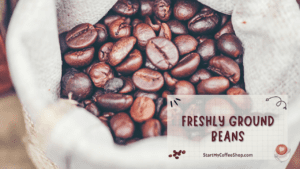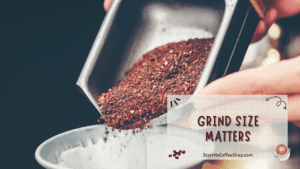Black coffee is an unquestionable favorite among coffee connoisseurs looking for a basic yet deep sensory experience. Black coffee, with its pure and unadulterated essence, provides a lovely canvas of flavors just begging to be explored and appreciated. For those who are new to the world of black coffee or who find its flavor insufficient, there is a treasure trove of strategies to elevate this modest beverage to unimaginable heights.
To make black coffee taste good, you should use freshly ground beans, hot water (195-205°F), and brew for 4 minutes. Experiment with beans, ratios, and grind sizes. Add a dash of cinnamon or nutmeg for extra flavor.
In this article, we explore the tips and tricks that can elevate a regular cup of black coffee to remarkable status. We reveal the procedures that will enable you to enjoy the full-bodied richness and depth that black coffee has to offer, from choosing the best beans to optimizing the brewing process and embracing slight additions.
Freshly Ground Beans: The Foundation of Flavor

Any outstanding cup of coffee starts with the beans themselves. Picking up premium, freshly roasted coffee beans is the first step in producing a truly delightful black coffee experience. Preserving the natural flavors of the beans is a distinguishing advantage of using whole beans as opposed to pre-ground coffee. The secret is to grind the beans right before brewing since this ensures that the flavor is retained as much as possible.
Just before brewing, ground the coffee beans to release a world of fragrant delights. Right after the coffee is ground, the essential oils and volatile chemicals that give it its particular flavor and aroma are at their height. When exposed to air for an extended period, these substances are vulnerable to exposure and can quickly disperse. Fresh grinding of the beans traps these tasty components within the grounds, improving the taste of the final product.
The richness, depth, and complexity that are naturally present in coffee are also released during the grinding process, resulting in a more complex and pleasant flavor profile. A symphony of tastes develops when the hot water mixes with the freshly ground coffee, creating a harmonic and pleasant cup that tantalizes the senses.
Read more about: Open a Coffee Shop Business Plan: From Startup to Caffeine Oasis
Optimal Water Temperature
The secret to releasing the entire range of tastes from the coffee grounds is in the temperature of the water used in the coffee brewing procedure. It is an important element that can have a big impact on how the finished brew tastes. It takes precision and focus to strike the ideal balance when adjusting the water’s temperature.
Coffee grounds run the risk of being scorched by hot water, which produces an unappealingly harsh and astringent flavor. Strong heat can remove unwanted components that overwhelm the subtle flavors that give each coffee its own identity. On the other side, excessively cold water fails to extract the whole spectrum of flavors, producing a weak and tasteless brew that is underwhelming.
195–205°F (90–96°C) is the ideal water temperature range for achieving the ideal equilibrium. The “sweet spot” for coffee brewing is in this temperature range because it promotes the best taste extraction while minimizing over-extraction of the bitter components. The water and coffee grounds work in harmony at these temperatures, bringing out the complex tastes and aromatic undertones that make a great cup of black coffee.
The Art of Brewing: 4 Minutes to Perfection
The final taste and quality of the cup are greatly influenced by the length of time spent brewing the coffee. Hot water and coffee grounds dance delicately throughout the extraction process, which can make or break the flavor profile. Over-extraction and under-extraction are two typical mistakes that coffee lovers frequently make, both of which can provide unsatisfactory results.
When coffee is brewed for an excessively long time, the water draws out an excessive amount of chemicals from the grounds. This is known as over-extraction. This produces a strong, bitter taste that overpowers the delicate flavors and leaves a bad aftertaste. In contrast, under-extraction happens when the brewing period is too brief, resulting in a weak and lifeless brew devoid of subtlety and depth.
For black coffee, 4 minutes is the recommended brewing duration to produce perfect harmony. The water absorbs the desired tastes and aromatic compounds from the coffee grind during this period, striking the ideal balance between strength and smoothness. The result is a cup of black coffee that is flavorful, rich, and lacking in excessive bitterness.
Experiment with Beans, Ratios, and Grind Sizes
Black coffee is a blank canvas with limitless potential, providing a delightful laboratory for investigation and experimentation. The essential charm of this well-liked drink comes in its adaptability, which enables coffee lovers to personalize their brews and learn about their distinct flavor preferences.
The secret to utilizing black coffee to its best capacity is to embrace experimentation. Explore the wide universe of coffee beans that are sourced from various places and roasted to varying levels. Each bean variety has its distinctive flavor, ranging from earthy and strong to fruity and fragrant. You will embark on a sensory trip by tasting and enjoying these various beans, gradually focusing on the flavors that most appeal to your palate.
The choice of beans is just the beginning of the trip, though. Investigate the proportion of coffee to water and grind size to learn more about the art of brewing. Your ability to customize the amount and intensity of your brew depends on how much coffee to water you use. A higher ratio yields a stronger, bolder cup, while a lower ratio results in a softer, more delicate flavor.
During brewing, the extraction process is directly impacted by the grind size. A coarser grind encourages a smoother and milder result, while a finer grind creates more surface area, resulting in a stronger brew. You may fine-tune your coffee to perfection by experimenting with various grind sizes, which offer up an infinite number of possibilities.
Coffee-to-Water Ratio: Finding the Golden Mean
A crucial element of brewing that profoundly affects the flavor and strength of your black coffee is the ratio of coffee to water. To create a cup that is properly balanced, tasty, and meets your personal preferences, this ratio must be just right.
The traditional coffee-to-water ratio is 1:15, or one part of coffee to every 15 parts of water, as a place to start. Those looking for a balanced flavor profile will appreciate the well-rounded and somewhat robust brew that this ratio produces. But the appeal of making black coffee resides in its versatility to different palates.
Increase the coffee-to-water ratio if you desire a stronger, more intense cup of coffee. A stronger brew with a bolder flavor profile, for instance, will be produced with a ratio of 1:12 or 1:10. For those who want a stronger coffee flavor and enhanced olfactory experience, this adjustment enables a higher coffee concentration.
On the other side, lowering the coffee-to-water ratio is the way to go for individuals who want a milder and gentler brew. A smoother and less strong cup will be produced by employing a ratio of 1:18 or 1:20, accentuating delicate flavor nuances and enabling a more delicate coffee experience.
Grind Size Matters: Fine-tune Your Brew

The pace at which tastes are extracted from the coffee beans is significantly influenced by the grind size of the coffee grounds during the brewing process. To brew a delicious and well-balanced cup of black coffee, achieving the ideal grind size is essential.
A medium grind is often the preferred choice for black coffee. This grind achieves a pleasing balance, permitting the best flavor extraction without straying into the territory of over- or under-extraction. Faster extraction occurs when using finer grinds, such as those used in espresso, since they expose more surface area to the hot water. However, when making black coffee, this might result in over-extraction, which can overwhelm the coffee’s subtle nuances and produce an unpleasant taste.
Coarser grinds are less exposed to the water, which causes the extraction process to proceed more slowly. When brewing black coffee, this might work for some brewing techniques, such as the French press, but it might result in under-extraction. The end product could taste weak, lacking in body and depth as a result.
The medium grind size reaches the ideal middle ground, enabling a balanced extraction that draws out the coffee’s aromatic components and essential oils without adding too much bitterness. This grind size makes sure that the water and coffee grounds interact with each other in the best possible way, bringing out all of the rich flavors and aromas in the coffee.
Read more about: Open a Coffee Shop Cost: Budgeting the Bean
Embrace the Symphony of Aromas: Cinnamon or Nutmeg
It can be enjoyable and satisfying to improve the taste of black coffee, and adding aromatic spices like cinnamon or nutmeg is one way to do this. In addition to adding delicious flavors to the coffee, these cozy and pleasant spices also entice the senses with their alluring fragrances.
Cinnamon gives black coffee a cozy depth thanks to its sweet and mildly smoky undertones. A little ground cinnamon may make an ordinary cup into a warming and decadent delight that makes you think of freshly baked pastries and the spirit of the season. A lovely symphony of flavors that dance over the palate is created as the cinnamon and coffee combine.
The earthy and nutty flavor of nutmeg makes it a fantastic alternative to try. A small amount of freshly grated nutmeg adds a delicate richness and enhances the flavor of coffee with its seductive aroma and subtly spiced undertones. Black coffee and nutmeg are similar to setting out on a sensory adventure where each sip reveals fresh layers of delight.
There are two ways to add these flavorful spices to your black coffee. One approach is to immediately mix the spice into the coffee grinds before brewing. This makes it possible for the tastes to meld with the coffee throughout the brewing process. Alternately, you may add a pinch of the spice on the top of the prepared beverage to give it a fragrant finish that will tempt your sense of smell even before you take a sip.
Frequently Asked Questions

How can I make my black coffee taste better?
Start with freshly ground beans and use hot water (between 195 and 205°F) for brewing if you want your black coffee to taste delicious. To prevent bitterness, let the coffee steep for around 4 minutes. To determine your favorite flavor profile, experiment with various beans, ratios, and grind sizes. For an additional aromatic touch, you can also add a dash of cinnamon or nutmeg.
Can I make black coffee with pre-ground coffee?
Pre-ground coffee can be used, but the flavor and aroma might not be as strong as with freshly ground beans. Just before brewing, grinding the beans helps retain volatile and essential oils, which results in a cup with greater flavor. Make sure the pre-ground coffee is of great quality and hasn’t been hanging around for too long if you use it.
At what temperature should water be used to make black coffee?
Black coffee should be brewed using water that is between 195 and 205°F (90 and 96°C) in temperature. Too much hot or cold water can produce bitterness or under-extraction and weak brew, respectively. Pour water over the coffee grinds after bringing it to a boil and letting it cool somewhat, or use a thermometer.
To learn more on how to start your own coffee shop, check out my startup documents here.
Disclaimer: The information provided by StartMyCoffeeShop.com (“The Site”) is for general informational purposes only. All information on the Site is provided in good faith. However, we make no representation or warranty of any kind, express or implied, regarding the accuracy, adequacy, validity, reliability, availability, or completeness of any information on the Site. Under no circumstance shall we have any liability to you for any loss or damage of any kind incurred as a result of the use of the Site or Reliance on any information provided on the Site. Your use of the Site and reliance on any information on the Site is solely at your own risk. This blog post is for educational purposes only and does not constitute legal advice. Please consult a legal expert to address your specific needs. Terms and Conditions. (https://startmycoffeeshop.com/terms-and-conditions/)

Hi! I’m Shawn Chun
My adventure in coffee began when I first launched my first coffee shop back in the early 2000s. I had to figure out so many things on my own and to make it worse within 2 years of opening two large corporate coffee chains moved in just blocks away from me!
As I saw smaller and even some larger coffee shops in the neighborhood slowly lose customers to these giant coffee chains and slowly close up shop, I knew that I had to start getting creative…or go out of business.
I (like you may be) knew the coffee industry well. I could make the best latte art around and the foam on my caps was the fluffiest you have ever seen. I even had the best state-of-the-art 2 group digital Nuova Simonelli machine money could buy. But I knew that these things alone would not be enough to lure customers away from the name brand established coffee shops.
Eventually, through lots of trial and error as well as perseverance and creativity I did find a way to not only survive but also thrive in the coffee/espresso industry even while those corporate coffee chains stayed put. During those years I learned to adapt and always faced new challenges. It was not always easy, however, in the end, I was the sole survivor independent coffee shop within a 10-mile radius of my location. Just two corporate coffee chains and I were left after that year. All told the corporate coffee chains took down over 15 small independent coffee shops and kiosks and I was the last one standing and thriving.
Along the years I meet others with the same passion for coffee and I quickly learned that it is not only “how good a barista is” that makes a coffee shop successful, but the business side of coffee as well.
Hence why I started this website you are on now. To provide the tools and resources for up and coming coffee shop owners to gain that vital insight and knowledge on how to start a coffee shop successfully.
Stick around, browse through my helpful blog and resources and enjoy your stay! With lots of LATTE LOVE!
Shawn







